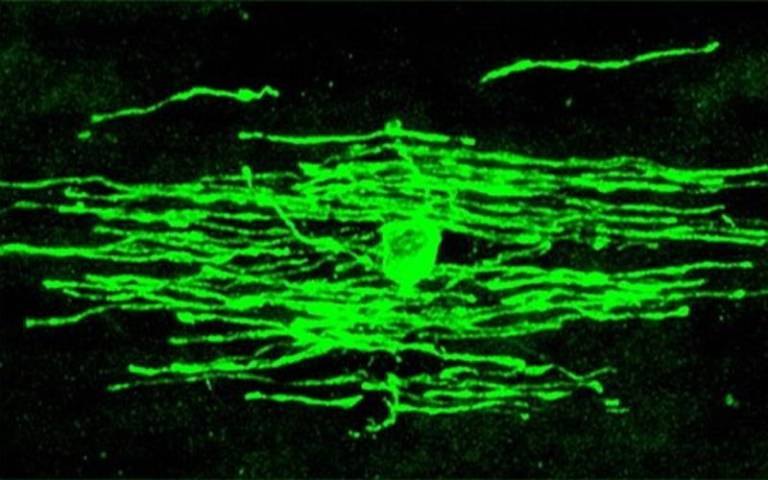Oligodendrocyte dynamics dictate cognitive performance outcomes of working memory training in mice
23 October 2023
The performance of mice in working memory-dependent cognitive tasks depends on OL genesis and is proportional to the number of OL precursors and OLs generated during training.

A myelinating oligodendrocyte formed in white matter during learning. Image by Dr Matthew Swire, MRC Career Fellow, WIBR, Division of Medicine, UCL
How and to what extent oligodendrocytes (OLs) contribute to learning and cognition is not well understood. Here, the authors show that the performance of mice in working memory-dependent cognitive tasks depends on OL genesis and is proportional to the number of OL precursors and OLs generated during training.
The study shows that generation of oligodendrocytes (OLs) and myelin in the brains of adult mice is strongly stimulated when the animals learn T-maze and 8-arm radial maze tasks that tax working memory. (Working memory in humans is a low-capacity, short-term memory system that is used in many cognitive processes such as decision-making and problem-solving; working memory performance is highly correlated with measures of general intelligence g). Conversely, genetic blockade of new myelin production prevented mice from improving their performance in the same maze tasks.
Remarkably, the performance scores of individual mice in the radial maze were directly proportional to the scale of OL proliferation and myelin production in the prefrontal cortex and associated white matter during training. In contrast, neuronal activity in the prefrontal cortex (estimated by c-Fos immunolabelling) correlated negatively with maze performance. This invites speculation that addition of myelin to axons within the prefrontal cortex refines neural circuit activity, reducing background noise and allowing more focussed and efficient performance of the task.
This study adds to growing evidence from the Richardson and other labs, that synaptic strengthening among neurons is not the only important thing during learning and memory formation – neo-myelination also plays a critical role, presumably by strengthening connectivity within and between separate brain regions involved in cognitive processing.
- Shimizu, T., Nayar, S.G., Swire, M. et al. Oligodendrocyte dynamics dictate cognitive performance outcomes of working memory training in mice. Nat Commun 14, 6499 (2023). https://doi.org/10.1038/s41467-023-42293-4
- Professor William D. Richardson Profile UCL
- Richardson Lab UCL
- What Mice in Mazes Can Teach Us About Working Memory
 Close
Close

